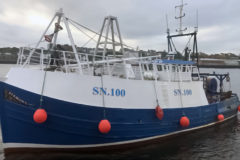Areas in Scottish waters where there is known to be gear conflict have not been subject to any targeted surveillance, according to Scottish fisheries minister Mairi Gougeon.
Gear conflict between static and mobile gear is endemic in some areas of Scotland, and Marine Scotland set up a taskforce to investigate the problem, which reported in 2015.
Aberdeenshire West MSP Alexander Burnett (Conservative) asked the minister ‘how many instances of targeted surveillance have been undertaken in areas where there is historically known to be gear conflict’. He pointed out that this was recommended in the taskforce’s report.
The minister (pictured above) admitted that targeted surveillance had been recommended, but said the report also recognised that ‘there are no statutory requirements for gear conflict avoidance or resolution, and no easy solution to the problem’.
“Our assets are tasked according to risks of legislative infringements, and therefore there has been no specific tasking with regards to gear conflict,” she told Alexander Burnett.
But she said Marine Scotland had introduced the Gear Marking (Scotland) Order 2020, which makes it a legal requirement for buoys used for fishing operations to display the vessel’s name and registration number.
Marine protection vessels had been engaged in ensuring vessels complied with this order, and ‘our inshore protection programme has enabled more agile and responsive monitoring in inshore waters’, she said.
She added that the outcomes of Marine Scotland’s 2017 inshore fisheries pilots initiative had addressed some of the causes of gear conflict and trialed approaches aimed at mitigating them.
“Our Mull pilot, for example, successfully introduced temporal and spatial separation of the creel and scallop dredge fleet, while the Outer Hebrides pilot is testing creel limitation as well as a low-cost approach to tracking and monitoring of fishing vessels.
“We are also continuing to encourage the industry to develop voluntary codes of conduct and providing support wherever necessary.”
She said that in 2020, Marine Scotland had introduced a new mechanism for reporting gear loss that ‘aims to take a holistic approach, facilitating fishers being reunited with displaced gear’. Lost gear could be reported to any of Scotland’s 18 fishery offices.
This would help fishers to arrive at an ‘amicable outcome’, but also ensure all information is available ‘should Police Scotland require to be involved’.
This story was taken from the latest issue of Fishing News. For more up-to-date and in-depth reports on the UK and Irish commercial fishing sector, subscribe to Fishing News here or buy the latest single issue for just £3.30 here.






